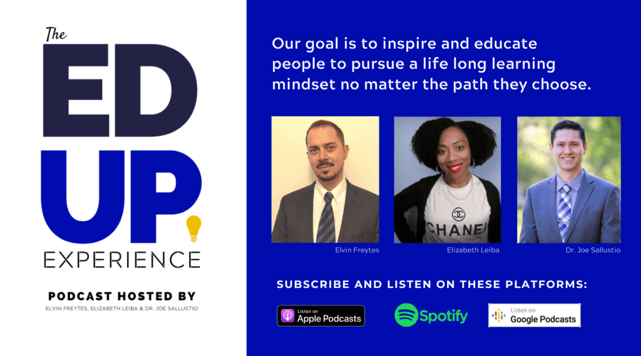Published on
Merging Humanistic Elements into the Virtual Experience

With the new normal directing higher ed toward the virtual environment, institutions need to make sure they don’t lose what’s most important in the student experience: the humanistic elements. Being isolated behind a computer screen means that higher ed needs to focus on how they can provide the right programming to ensure their students still feel connected to their school. In this interview, Joe Sallustio and Elizabeth Leiba speak with Nathan Long to discuss how universities are adapting their residential experiences to the virtual environment, the process behind online programming and the TCS Education System model that has helped financial distress.
EdUp Experience: What is Saybrook University?
Nathan Long (NL): For the longest time, Saybrook University really functioned with two doctoral degrees for many years: psychology and human science. And over time, it started to develop in a variety of different areas, including clinical psychology, mind, body medicine and then leadership and organizational development. When Lorne Buchman was president, his vision was to have multiple colleges and schools focused on humanistic philosophy. It’s all about working together toward ensuring one’s education, mental health and wellness.
It really looked to democratize the educational experience to create an opportunity for students and faculty collaboratively, as opposed to what might be considered typical hierarchies of graduate education. Today, we have about 800 graduate students, who hail from all across the country and around the globe. We have about 30 masters and doctoral programs in a range of disciplines and sub-disciplines encompassing psychology counseling, mind and body wellness, nutrition, business leadership, and transformative social change.
Most of our students are also non-traditional, and the non-traditional student is probably more traditional now than ever. The average age students is about 42 years old. We have a growingly diverse population of students and faculty, and certainly from all backgrounds. So, it is a great institution founded by great luminaries and with a great future ahead, based on a lot of the work we have done over these years.
EdUp Experience: How has COVID-19 affected your ability to have residential conferences, and how are you supplementing that experience?
NL: It’s a part of Saybrook’s DNA. We started off as a distance learning institution. Before there were computers it was mainly telephonic and mail. Once we entered the internet age, Saybrook shifted into that and has been, as you noted, primarily virtual in nature with our feature being the residential conference experience. We would have those twice a year pre-pandemic. It’s essentially a seven-day learning festival—a communal gathering and engagement across multiple programs, symposia, activities, etc.
So, with the pandemic, we just had our first Virtual Residential Conference experience. Everyone was biting their nails because we wanted to replicate the live experience, but we were able to accomplish it. It wasn’t easy and took a lot of planning and thoughtful engagement, but we found a lot of success this year with it. It was a great first outing for us, and lessons were learned for sure, but a lot of inspiration also emerged from that event.
In terms of the actual virtual classroom experience, it was fairly seamless. I won’t say it was easy for everybody. Faculty and students are struggling with the horrors of this pandemic coupled with the racial issues that we’ve been experiencing for decades (and hundreds of years) compounded by a variety of other instabilities throughout our political and social ecosystem. So, it was a transition for a lot of folks just to get their bearings.
Being virtual, we were able to create a stable foundation for our students and faculty to convene over these last months. And we were able to provide additional supports that may not have otherwise been in place, so it’s given us an opportunity to innovate and hold our community together in solidarity.
EdUp Experience: Can you tell us about the intentional process of developing an online program?
NL: If the delivery model is secondary to the goals and outcomes you’re seeking in the course, the model can help actualize those outcomes in really powerful ways. But sometimes we get ahead of ourselves and try to put all of the newfangled tools in place, which is great, but it also has to be done in tandem with understanding the learning outcome you’re seeking. As we evolve, that has been a core focus—who is at the center of the learning? Each course and each student has different needs, so you need an excellent faculty member designing a course as well as a curriculum committee designing courses.
One of Saybrook’s secret sources is our ability to merge the humanistic element into our virtual experience. A student will get a common experience across most of their courses, but the opportunities and actual educational elements will change dramatically, depending on whether it’s a psychology class on existential humanism versus a clinical outcomes class, or a pro-seminar versus a business class. And some may incorporate asynchronous learning techniques into synchronous learning techniques. Some may implement some of the most up-to-date technology while others rely on Zoom, which is not old technology but certainly not on the cutting edge.
So, there are a variety of tools used to accentuate learnings, which goes into our overall philosophy around the online experience. What really makes our curriculum unique is the way in which our faculty engages with students on a personalized level, especially due to our size, scope and focus on grad programs. In the online space, we do have an obligation to continue innovating both on the learning management platform side as well as with the tools that are used, so we’re not falling behind.
EdUp Experience: Can you talk about the model of TCS Education and Saybrook’s role in that model?
NL: One of the most foundational aspects of Saybrook’s success over the last six years of my presidency has been our affiliation with TCS Education System, which stands for The Community Solution Education System.
We joined back in 2014; I had just started checking Saybrook out in terms of recruitment and found out it was joining the system of other colleges and universities because it was experiencing a lot of financial distress, a lot of pressure in enrollment and otherwise. We had a very serendipitous set of meetings with Dr. Michael Horowitz (who lead the system and the board at the time), to really talk about how to maximize Saybrook’s long-term sustainability.
We were able to turn it around from million-dollar-plus annual deficits for the previous eight years, to realizing our fourth year of annual surpluses–a million-dollar shift this for re-investment–which is a true testament to the partnership we have with TCS.
TCS offers institutions the ability to affiliate themselves as a partner, so the institution itself retained much of its autonomy. For example, I have my own board, report to my board chair and of course to the full board. We have obligations to the system relative to certain pieces of governance, but by and large, everything from our financial, strategic, and enrollment teams are housed at the university. It’s really working in partnership with the services TCS offers to maximize and leverage the teams that we have in place to really supercharge our efforts synergistically.
I also serve on the leadership team at TCS, so I have a voice in the work done at the system level. They integrate according to the key strategic initiatives that we advance. So ultimately, we pay a fee for services that they then provide to us. And those services range from human resources, backend operations, legal counsel, financial aid packaging for Title IV finances. It’s specifically around the auditing function, financial investments and portfolio management, admissions, data, operations, and analytics.
The system is now in a position to seek institutions that are excited and interested in a true-form collaboration as both a system and their own institution of higher learning. We’re looking for partners who have a sincere desire to advance both institutional aims as well as important aspects of access and value in higher education.
EdUp Experience: Why are we not seeing more schools doing this?
NL: Part of the answer lies within the desire to maintain legacy and history. Some faculty don’t want to lose an institution’s essence, its mojo, its mission, and you don’t want to get subsumed or there’s fear of losing our identity. As a former faculty member, provost, and then chief academic officer, the difference is very clear to me. In terms of the options, either you move yourself into obsolescence by not advancing, or you move yourself toward going out of business if you don’t try to evolve.
It doesn’t have to be TCS’s system, but institutions have to at least be thinking about those. How do you let go of some of the old trappings for many of the faculty while recognizing that new ways of doing the business of higher education have great value?
We’ve started sharing resources with our colleagues, and it has created a different level of collaboration. It helps drive costs to reasonable levels, creating the maximum opportunity for learning. There’s just so much that can be done now; that doesn’t mean that everything has to or should be done, but it certainly opens doors
The way things used to be are no longer working. When you have a hundred institutions across the country closing over seven months, it’s not good. When you have institutions barely able to make payroll and who don’t have enough cash on hand to pay their faculty for six months, it’s not good. So, we need to reenvision and repackage.
EdUp Experience: What do you see as the future of higher ed, and is there anything else you’d like to add?
NL: I see higher education on the precipice of something pretty amazing. The power of what we offer, the amazing students and people who work for us really have the potential to unleash our country’s greatest asset, and we just need to get out of our own way. That means that our focus has to be on greater collaboration leading toward innovation. You’re seeing that in the private sector with systems like TCS Education System, but there are other consortium arrangements happening among public institutions. It’s going to require a full-on effort to help institutions create new dynamics for learning and for the business of higher education moving forward.
Saybrook University and other institutions are serving a vital need right now in a country that is seeing way too much distancing in its population. Our institutions offer proximity to human connection, for which there’s an exponential need even in the virtual space.
This interview was edited for length and clarity.
Listen to the full interview here.

Disclaimer: Embedded links in articles don’t represent author endorsement, but aim to provide readers with additional context and service.
Author Perspective: Administrator



